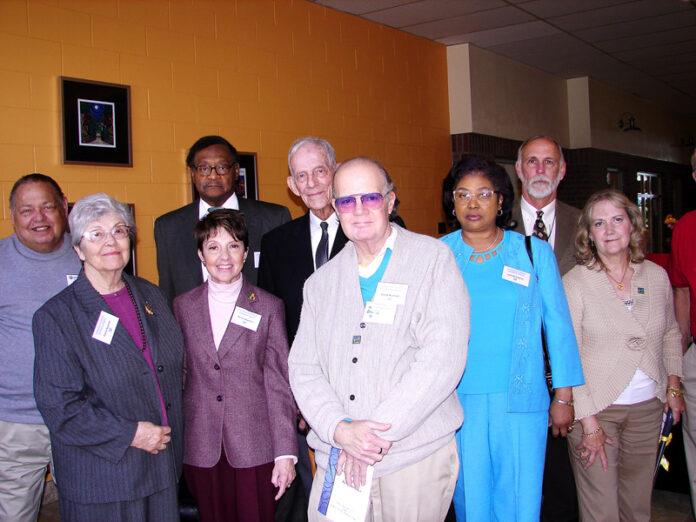
Being a transplant recipient is no laughing matter.
However, the opposite would seem to be true when observing a group of them at a recent dinner gathering. The joy and laughter being shared was genuine and contagious. There were enough jokes and witty remarks flying around to make everyone’s sides hurt with laughter. How can people who have been through so much laugh so easily? Perhaps it is because they, unlike most, are acutely aware of the fragility of life. Often times they have been at death’s door and the infinite possibilities of a life well lived are always in their mind’s eye.
Hearing their stories up close and personal is a life-changing transaction.
Prior to 1997, John Cecil, a heart recipient, had a “best friend.” His name was “George” and he was an IV bag. George and he were constant companions. At the age of 73, Cecil had already had two bypass surgeries and the time had come when he could hardly move at all. He waited 27 months to receive the transplanted heart that has been beating in his chest for the past 13 years. A dapper dresser who drives a sporty little car, he points out that although he is 86 years old, his heart is only 55. His new heart helped him care for his wife of 54 years, 53 days and 2 hours as she lived for four years after having a stroke – an opportunity he is grateful to have had.
A former pilot, Cecil managed to attend a reunion of his reserve fighter squadron — on the way home from the hospital after his transplant. Two years ago he traveled to Prague and Berlin. While his credentials and sheer drive sound impressive, it is his kindness and generosity that leave a lasting impression.
He explains, “I made a pact with myself never to do anything to dishonor what the original owner of this heart would have done. I have never cheated anyone or hurt anyone intentionally; I treat others like I would like to be treated.” He adds, “I have been frightened enough a few times in my life to have my knees knock, and I think you should live life to the full until you die.”
Another transplant recipient, Tom Philips, is a slender grandfather who loves to rave about his family. He shares, “For me, my heart transplant in 2003 was all about family. My wife has been my guardian angel for the five years that I progressively worsened waiting for a new heart, and ever since, trying to rein me in whenever I get too rambunctious or cocky. She still won’t let me go to UVA for quarterly visits by myself. [She’s] afraid, I guess, that I’ll miss something.”
Family for Philips means six children and fourteen grandchildren, five of whom were born after his transplant and have “shared my rebirth with me.” This is the family “that has accompanied Alice and me to 3 different Transplant Olympic games, cheering me on as I flailed away on a bike, in ping pong games, in a race walk, or in the water . . .wondering, I’m sure, whether I was going to sink to the bottom.”
He proudly adds, “The oldest grandchild is 17 and looking at colleges. The youngest, at ages two and three, allow me to get on the floor and roll around and act like a kid.”
Philips becomes a bit philosophical, saying, “I used to count the days of my new life, but after reaching 1000, then 2000, I stopped counting — but still enjoy every day as a new day in a new life.”
Penny Baynton is a petite woman who is the force behind “Transplants United,” a support group for organ donors and recipients that meets monthly in Salem. She is also a double transplant (kidney and pancreas) recipient.
She can quickly recall the misery she experienced prior to her transplant. She recounts that “After 22 months on peritoneal dialysis I forgot how it felt to be well. After 38 years of Type 1 Diabetes, I forgot how it felt to be free. Post-transplant, I’m free of the immediate concern that my blood sugar will go too low or too high, both of which cause life-threatening complications, often landing me in the hospital. I lost sight in both eyes on two separate occasions and would have gone blind but for laser technology. In 1997 at age 45, I had a heart attack. My worst nightmare came true about six months later when my kidneys stopped functioning.”
Baynton, too, is left with a deeper appreciation for the second chance she has been given.
She wants people to know that “I learned that life is never completely independent, but inter-dependent. I think I’ve matured through the experience of transplantation from self-absorbed isolation to awareness of and gratitude for the similarities and marvelous diversity of life. I have a heightened appreciation for interdependence versus independence, the love of family and nurturing relationships versus personal ambition that sometimes got in the way. I celebrate each day with joy.”
Baynton offers her gratitude and spiritual perspective as well, saying, “Two complete strangers offering me the ‘gift of life’ is evidence of God’s mystical and mysterious grace. In 1 Corinthians 12:12-17 and in the following Chapter 13, the Apostle Paul eloquently describes a spiritual transformation that I’ve experienced. I am blessed and what greater joy is there?”
Regardless the difficult and varied journeys most transplant recipients have travelled, they tend to “arrive” at the same destination – one of renewed hope and a heightened appreciation for each day they are alive.
For more information on Transplants United phone 800-847-7831 ext. 4914, and for information on organ donation, visit www.kidney.org.
Editor’s Note: Reporter Christine Slade is an organ donor who through this generous act, extended her own granddaughter’s life by 13 years.
By Christine Slade [email protected]